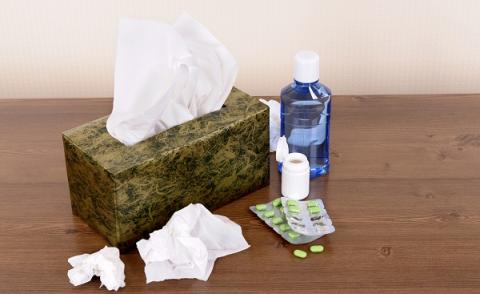Hayley Leonard is an Anthony Nolan Post-Transplant Nurse Specialist and has worked as a nurse in stem cell transplant care for the past 10 years. She previously talked to us about dealing with infections after transplant,
Dr Rob Danby is a Consultant in Haematology at Oxford University Hospitals NHS Foundation Trust and part of the Anthony Nolan Research Institute.
Here they answer your questions about dealing with coughs and colds during these chilly winter months.
What are coughs and colds?
Dr Rob: A cold is a non-medical term for a viral infection of your tonsils, nose and throat. It causes symptoms such as sneezing, sore throat and a blocked or runny nose. There are many different types of cold viruses.
A cough is just a symptom; your body’s reflex to irritation in the upper part of your airways or back of the nose.
Why do I get more colds since I’ve had my bone marrow transplant?
Hayley: After a transplant, people might be more prone to coughs and colds, but this should improve as time goes by. You might find colds just last a bit longer and you get them more often than your family or friends.
How are coughs and colds passed on? Can I avoid catching one?
Dr Rob: They’re airborne viruses, spread through coughing and sneezing. They’re also passed on when you come into contact with droplets of fluid containing the cold virus – so through touching someone, an object or surface. That’s why hand-washing is an important way to reduce your risk of colds.
In terms of messages about avoiding people, it’s about taking sensible precautions, particularly in the winter months when colds are more common. You don’t want to avoid crowds forever; it’s about avoiding people with obvious symptoms, just as you would before your transplant.
Try and live your life as normal. You can make your own decisions and do things that you want to as before, like going to weddings and gatherings. Weigh up what’s important to you.
Hayley: In the early days after your transplant, try and avoid people you know have coughs and colds. Avoid large crowds, wash your hands, and use tissues if you’re sneezing.
With time you can be more relaxed. Use your common sense, but you don’t have to be so strict with crowds and transport. It’s about building up your confidence, I want my patients to become gradually more independent.
We also recommend flu jabs every year for life, no matter how long ago your transplant was.
What should I do if I have a cold or cough?
Dr Rob: While your immune system is still recovering or you’re taking medication that’s suppressing your immune system, like cyclosporine, call your transplant team if you have symptoms of a cough, cold or high temperature. Your team may need to examine you and test for certain viruses to determine if you need any treatment. However, if it’s been many years since your transplant and you’re otherwise well, then you can treat the cold as anyone else would. Remember, if in doubt, or you’re worried or become unwell, then talk to your transplant team or your own GP.
What treatment will I need?
Hayley: What treatment you need depends on what is causing your symptoms. We’ll take a sample from inside your nose, so we can identify the type of infection and decide on the right treatment. A virus like the common cold doesn’t need treatment, but other respiratory viruses might mean you will need to come into hospital to have a nebuliser, which is a way of inhaling a high dose of medicine. If you have a cough, and you’re bringing up green coloured sputum (saliva and mucus that you cough up), it could be a bacterial infection and you might need antibiotics.
Find out more:
Read more in Hayley’s interview, Fighting infection after transplant – your questions answered.
Read more about recovery after your bone marrow transplant
DISCLAIMER: At Anthony Nolan we take great care to provide up-to-date and accurate facts about stem cell transplant. We hope the information here will help you to look after yourself. Each transplant centre will do things differently, so this blog is just a general guide and it’s not intended to replace advice from your doctor. Please speak to your transplant team for more details about your own situation.
